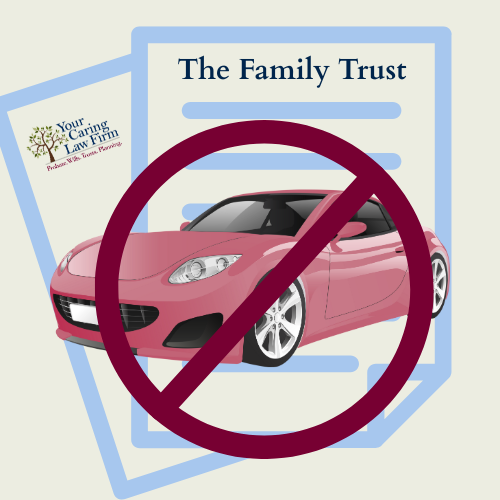When you’ve gone through the effort of creating a revocable living trust, the next step is funding it, the process in which you transfer assets into the trust’s name to avoid probate. But what about your car? Should you title your vehicle in the name of your trust?
Short Answer: No. Here’s Why.
While it might seem like a good idea to transfer everything into your trust, vehicles are an exception, at least in Florida. If you title your car in the name of your trust, you will find it almost impossible to get auto insurance, because your trust isn’t a driver. Also, if you did get insurance, and you had an accident, it flags the other driver’s insurance company’s legal team, screaming:
“This is a deep-pocket defendant! Come after me!”
Why? Because trusts are often associated with larger estates, making them prime targets for lawsuits and higher settlements. Instead of treating your insurance limits as the cap, a plaintiff’s attorney may argue that the trust’s other assets should be considered fair game.
What’s the safer alternative? Keep your vehicle in your personal name and rely on a solid insurance policy with high liability and umbrella coverage for protection.
But Wait… What About Probate?
If your vehicle remains in your name alone, what happens when you pass away? Will your family have to go through probate just to transfer the title?
Not necessarily. Florida provides several options to transfer a vehicle without opening a full probate case.
Option 1: Surviving Spouse Transfer
If your spouse is your sole heir, the process is simple and there’s no probate required. (This also applies to jointly titled vehicles, but I do not recommend jointly titling vehicles because of asset protection issues.)
Florida law allows a surviving spouse to transfer the title by visiting the DMV with:
✔️ Form HSMV 82152 – Application for Surviving Spouse Transfer
✔️ Certified death certificate
✔️ Proof of identity (driver’s license, ID, or passport)
✔️ Marriage certificate (if the death certificate doesn’t list the spouse’s name)
The title replacement is free, but registration fees may apply if the registration changes. There is also a $10 expedited title fee for same-day processing. We recommend making an appointment at your local DMV or tax collector’s office.
This allows the surviving spouse to take over the vehicle immediately, without court involvement.
Option 2: Probate Alternatives for Non-Spouse Heirs (Even With a Trust-Based Plan)
If you’re not married and your vehicle is not part of your trust, Florida offers simplified probate alternatives for small estates.
- Disposition of Personal Property Without Administration(For very small estates)
- Available only if the estate has no real estate and minimal remaining probate assets.
- An heir can file a Disposition of Personal Property Without Administration form with the probate court to transfer the vehicle quickly.
- Summary Administration (Simplified Probate Process)(For slightly larger estates)
- If the total probate assets outside the trust are under $75,000, or the decedent has been gone more than 2 years, heirs can request summary administration to transfer the title.
- This avoids full probate while still ensuring the vehicle is legally transferred.
Final Thoughts: Keep It Simple & Protected
If your trust was funded with all assets properly, probate shouldn’t be needed at all. But if a vehicle is left out, small estate procedures can help transfer it without interfering with the trust-based plan.
- Don’t title your car in your trust—it’s a liability trap.
- Spouses can transfer the title directly at the DMV—no probate required.
- For non-spouse heirs, probate alternatives exist to simplify the process.

